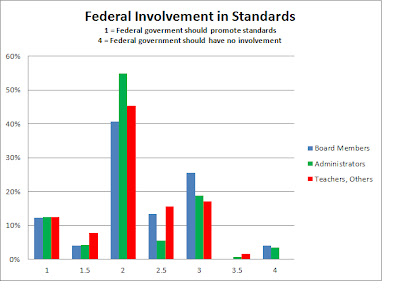This topic was prompted by the debate over the Common
Core reading and math standards both nationally and in the 2013 Kansas
Legislature. The Common Core standards
were developed as a project of the National Governor’s Association and the
Council of Chief State School Officers.
The Common Core is not a federal requirement, but the Obama
Administrators has create incentives for states to adopt them and provided
funding to develop new tests based on the standards, leading to criticism that
the project represents a further federal intrusion into education.
The Kansas State Board of
Education adopted a modified version of the Common Core standards in 2010, and
has incorporated them into the No Child Left Behind waiver. The Board is in the process of determining a
new state testing program based on these standards. Although not originally controversial, opposition to the common standards movement and related testing initiatives has intensified in recent months. Several bills were proposed in the 2013
Legislature to stop or “pause” implementation of the new standards and tests.
At the June KASB advocacy meetings, participants
were given a survey form with five topics concerning standards and
assessments. For each topic, two
opposing statements were given, the first represented by position 1 on a
four-point scale; the second by position 4.
Participants were asked to rate how closely they agreed with either
position. Some participants marked
between the numbers, with a “2.5” being half-way between the positions, or
essentially neutral or undecided.
Should Kansas use academic standards that are common to other states?
In contrast to Legislative concerns, participants overwhelmingly support adopting standards that reflect “common” expectations for college, military service or employment.
At last 90% of each group leaned in this direction, with nearly 50% of board members and over 60% of administrators choosing “4” or complete agreement. Teachers/others were more evenly split between “3” and “4,” but only a handful indicated any opposition to common standards.
Should the federal government promote academic standards?
The second topic concerned the role of the federal government in promoting standards. A “1” meant agreement that the federal government should promote national standards because education in a national interest, even if not a constitutional duty of the federal government. A "4" means the federal government should have no involvement.
A majority of each group answered “1” or “2,” but the most common response was “2,” which leans toward supporting federal involvement but suggests some concerns. Only about 20% to 30% of respondents picked "1" or "2," on the side of no federal involvement in educational standards.
Should students be expected to meet the same standards for graduation?
A majority of all three groups chose “3” or
“4,” supporting more flexibility in student expectations. However, the largest numbers supported “3,”
which leans toward that position without complete agreement. Likewise, between 20% and 30% of each group
picked “2,” which "leans" toward having all students meet the same standards. Less than 10% of each group selected “1,” indicating complete agreement with
having all students graduate from demonstrating readiness for a four-year
college.
Should districts be able to choose different assessments for state accountability?
The fourth topic concerned whether all districts should be required to use the same state assessments for accountability (“1”), or whether districts could be given flexibility to choose among more than one assessment (“4”). Kansas is participating in one of two multi-state consortia developing new tests based on the Common Core reading and math standards. In addition, national testing companies are also developing competing tests, and there is disagreement among some school leaders as to how Kansas should proceed.
Some school leaders have suggested Kansas could pursue idea of
allowing districts a choice in their testing program, although it is unclear
whether that would meet federal requirements.
However, a majority of each group agreed or leaned toward requiring the
same assessment. Approximately 25% of
each group picked “3,” leaning toward allowing district choice, but less than
10% of each group picked “4,” completely agreeing with district flexibility.
How important are standardized tests for accountability?
The final topic concerned the importance of standardized testing in accountability, with “1” meaning that standardized testing is the most important factor in educational accountability and “4” meaning that teaching and local school boards can best determine accountability without standardized tests.
Board members and especially administrators overwhelmingly
leaned toward supporting standardized testing.
Teachers/others were much more split, with about one-third leaning each
direction and over 25% in the middle. Despite concerns about over-reliance on testing, a majority of school leaders seem to believe they play an important role in school accountability.
These results indicate school leaders are generally very comfortable with the Common Core standards and the concept of common standards across the state states, whether or not the federal government is involved in promoting such standards. Board members and administrators are also generally supportive of standardized tests for accountability and a way to measure districts against themselves. Finally, school leaders lean toward allowing some variation in the expectations for students graduating from high school.
Next, we'll look at school leader attitudes on teacher collective bargaining.
These results indicate school leaders are generally very comfortable with the Common Core standards and the concept of common standards across the state states, whether or not the federal government is involved in promoting such standards. Board members and administrators are also generally supportive of standardized tests for accountability and a way to measure districts against themselves. Finally, school leaders lean toward allowing some variation in the expectations for students graduating from high school.
Next, we'll look at school leader attitudes on teacher collective bargaining.






No comments:
Post a Comment
(Comments on this blog are moderated.)